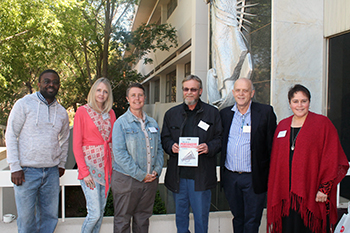Latest News Archive
Please select Category, Year, and then Month to display items
12 October 2020
|
Story Arina Engelbrecht
|
Photo Supplied
 Arina Engelbrecht from Organisational Development and Employee Well-being believes physical activity has a number of benefits for one’s health, including stress relief.
Arina Engelbrecht from Organisational Development and Employee Well-being believes physical activity has a number of benefits for one’s health, including stress relief.
Being physically active plays a big role in preventing the development of mental-health problems and in improving the quality of life of people experiencing mental-health problems.
Treatment for depression
Physical activity can be an alternative treatment for depression. It can be used as a stand-alone treatment or in combination with medication and/or psychological therapy. It promotes all kinds of changes in the brain, including neural growth, reduced inflammation, and new activity patterns are formed that promote feelings of calm and well-being. It releases endorphins – powerful chemicals in the brain that energise your spirit and make you feel good.
Physical activity can be very effective in relieving stress. Research in adults has found that physically active individuals tend to have lower stress levels compared to individuals who are less active. It also leads to improved sleep. When a person sleeps better and feels more rested, overall quality of life improves. They cope better with daily life stressors.
Reduce Alzheimer's risk
Regular physical activity can reduce your risk of developing Alzheimer's disease by up to 50%. It can also slow down further deterioration in those who have already started to develop cognitive problems. It stimulates the brain’s ability to maintain old connections as well as to make new ones.
A study asked people to rate their mood immediately after periods of physical activity (e.g. going for a walk/run, cycling, doing housework) and periods of inactivity (e.g. reading a book or watching television). Researchers found that participants felt more content, more awake, and calmer after being physically active compared to after periods of inactivity.
In conclusion, people who are physically active feel a sense of well-being, feel more energetic throughout the day, sleep better at night, have sharper memories, and feel more relaxed and positive about themselves and their lives.
“Being physically active not only changes your body, it changes your mind,
attitude, and your mood.” – Arina Engelbrecht
International delegates attend SACOMM conference at UFS
2016-10-12

From the left: Prof Colin Chasi, Chairperson of the
South African Communications Association,
Dr Dalme Mulder UFS Lecturer; Dr Wilmien Marais,
UFS Lecturer; Prof Johann de Wet, former head of
UFS Department of Communication Science
Prof Tom O’Regan, University of Queensland (Australia)
and Prof Milli Rivera, Head of the UFS Department of
Communication Science during the conference on the
UFS Bloemfontein Campus.
Photo: Rulanzen Martin
Communication from within and below: Social Transformation and Inclusiveness. That was the theme of the 2016 South African Communication Association (SACOMM) conference, hosted at the Bloemfontein Campus of the University of the Free State (UFS) from 3 to 5 October 2016.
“Through this theme, participants were invited to submit papers that examined the role of communication in today’s tumultuous climate,” said Prof Mili Rivera, Head of the Department of Communication Science at the UFS.
A total of 140 delegates from other South African universities, as well as international delegates from Zimbabwe, Nigeria, the United Kingdom, United States, and Australia attended the conference. It was the second time in ten years that the UFS hosted the conference.
Organisation to mentor and support emerging scholars
Various staff members and students from the UFS Department of Communication Science presented papers during the three days.
Annette van Baalen and Dr Dalme Mulder, both lecturers in the department, won the best paper award in the Corporate Communication division. A number of emerging scholars also presented papers. “The organisation is committed to mentoring and supporting emerging scholars in the field of Communication Science,” said Prof Rivera.
Association must be agent of change in curriculum
Delegates discussed the role of the organisation (SACOMM) as an agent of change in terms of decolonising the curriculum. The focus was on training journalists to cover crises in a fair and balanced manner. The book The Art of Persuasive Communication - A Process (4th Edition) by Prof Johann de Wet, former head of the UFS Department of Communication Science, was also launched during the conference.
The next SACOMM conference will take place at Rhodes University in 2017.